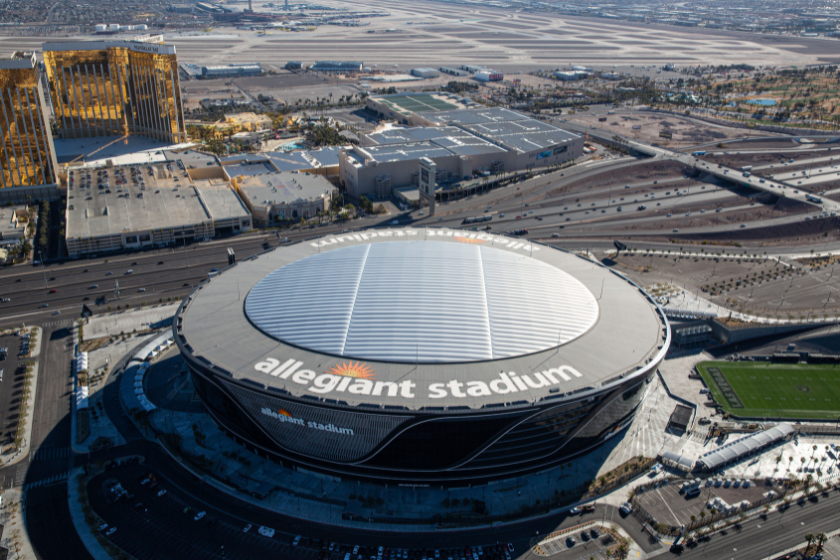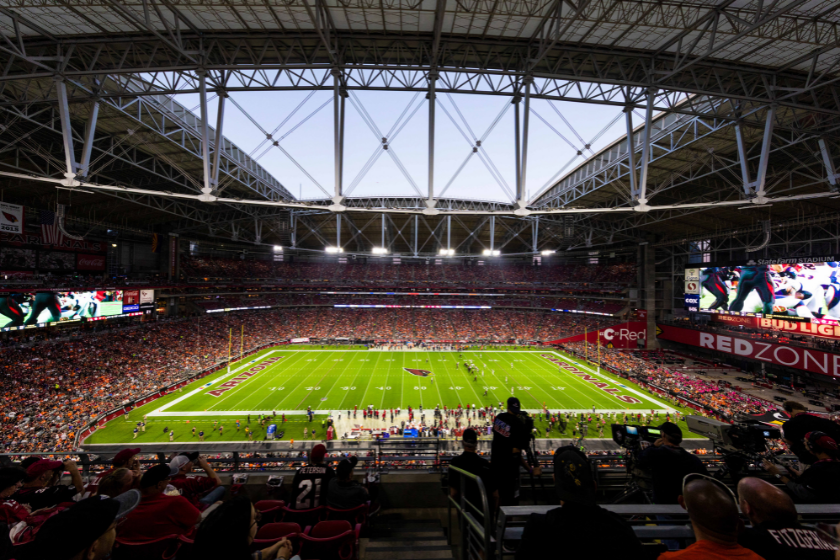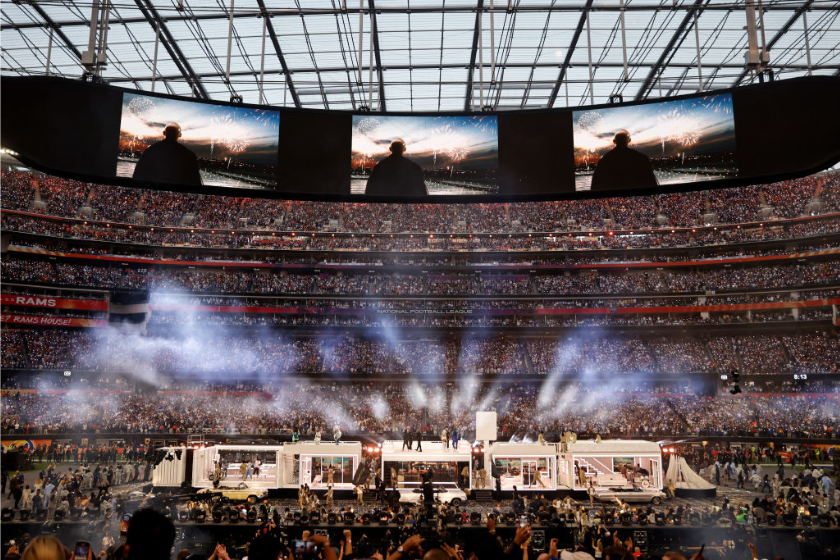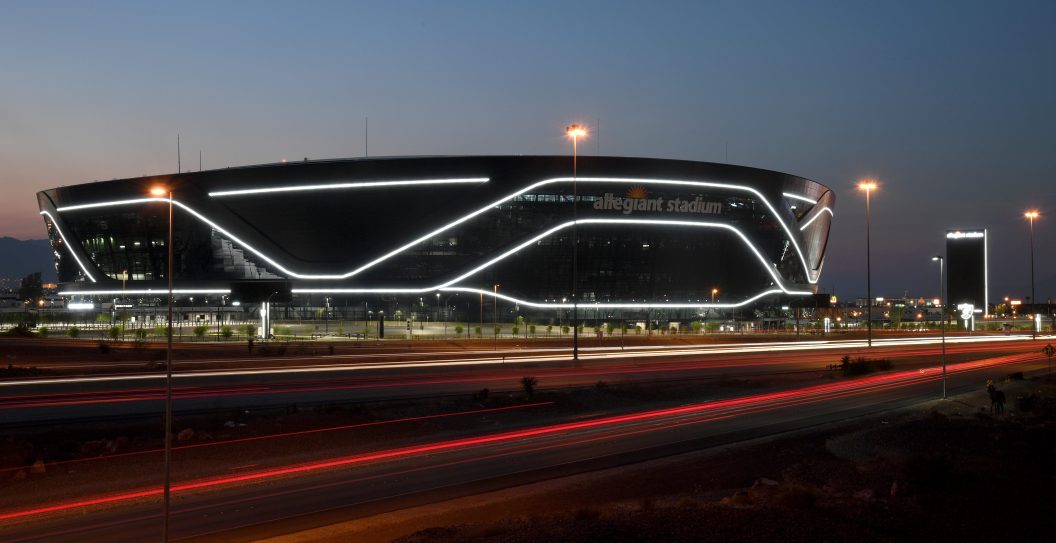Unless you live in New Orleans, Louisiana, Glendale, Arizona, or the Tampa Bay-Miami area in Florida, having the Super Bowl hosted in your favorite team's stadium is likely a rare occurrence. And it's not likely to become any more common. So, where is the Super Bowl this year? Good question. Let's take a look.
Videos by FanBuzz
Heading into the tail end of the 2023 NFL regular season, the Super Bowl locations have been announced for through the 2026 season for Super Bowl 61. After this season, the Super Bowl will be hosted in New Orleans in 2025, Levi's Stadium in Santa Clara in 2026, and the beautiful SoFi Stadium in Inglewood, California once again in February of 2027.
A location like Indianapolis won't be getting the Super Bowl again any time soon, but this likely won't be the last time we see a Super Bowl in Las Vegas like we're seeing this season. This year's Super Bowl will be held at Allegiant Stadium in Las Vegas, the home of the Raiders, for Super Bowl 58.
Why Your Town Isn't Getting the Super Bowl Anytime Soon

George Rose via Getty Images
The first Super Bowl was held in California at the Los Angeles Coliseum, but the next five were held either at the Orange Bowl in Miami or at Tulane Stadium in New Orleans. Those two towns accounted for 10 of the 15 Super Bowls.
There have been 11 Super Bowls in the Miami metropolitan area and 17 total in Florida, if you include the five in Tampa and the one in Jacksonville. California has hosted 13 NFL championship games, with the San Francisco 49ers' new home — Levi's Stadium — hosting Super Bowl 50.
Las Vegas will become the 16th unique region to host a Super Bowl when the big game comes to Allegiant Stadium, home of the Las Vegas Raiders, at the end of the 2023 season. Perhaps the Cowboys will finally end their Super Bowl droughts in the desert, or Patrick Mahomes will lead another Chiefs team to the promised land with his third Super Bowl ring.
Another reason the Super Bowl is held in only a handful of locations is the weather. Can you imagine a Super Bowl at Acrisure Stadium in Pittsburgh? Or how about a Super Bowl hosted in Denver, where the Broncos have an edge over the Carolina Panthers? In between Super Bowl commercials, Al Michaels could react to shots of frigid fans just trying to stay warm enough to see the final game of the NFL season. You'll never see a Super Bowl kickoff in a cold climate. Even former MVP Tom Brady prefers his American football indoors where it's warm.
How Are Super Bowl Locations Chosen?

Ric Tapia/Icon Sportswire via Getty Images
The chances of an unconventional Super Bowl host emerging became even slimmer when the NFL changed the system for selecting Super Bowl host cities, beginning with the selection of Super Bowl LVII.
Previously, prospective host cities were able to submit bids (and ostensibly influence during the bidding and voting process). That's how we ended up with MetLife Stadium, home of the New York Giants and New York Jets, hosting a Super Bowl in the 49-degree New Jersey weather. Imagine if Brady's New England Patriots had the opportunity to play a Super Bowl in Gillette Stadium.
In 2018, the NFL began unilaterally selecting a Super Bowl host city. The selected venue would THEN put its proposal together to have it rubber-stamped by the league's owners.
SoFi Stadium in Inglewood, California — where the NFC champion Los Angeles Rams and Matthew Stafford defeated the AFC's Cincinnati Bengals and Joe Burrow a year ago in their Super Bowl LVI matchup — hosted the event for the first time in fantastic fashion. The Rams became the second straight team to play a Super Bowl in their home stadium after Super Bowl LV was held in Raymond James Stadium, where the Tampa Bay Buccaneers topped the Kansas City Chiefs for their second title in franchise history. We talk about home-field advantage in the NFL playoffs, but having it in the Super Bowl is another thing entirely.
Don't Forget the Music

Michael Owens/Getty Images
The Super Bowl halftime show is one of the marquee events of the week — outside of the big game, of course. Last year's concert included a who's who of rap and hip-hop stars — including Dr. Dre, Snoop Dogg, Eminem, Mary J. Blige and Kendrick Lamar — performing in the bright lights of Hollywood at SoFi Stadium. In 2021, The Weeknd took to the stage in Tampa, Florida, while the year before that saw Shakira and Jennifer Lopez perform, appropriately, at Hard Rock Stadium in Miami. With headliners like that, it's easy to see why ESPN, Fox, CBS and NBC Sports battle over the broadcast rights every year.
As much as the NFL wants to reward the AFC and NFC champions with a warm locale and an electric night life during Super Bowl week, it also wants to make sure that its selection of Super Bowl host will attract the biggest names in entertainment for the Super Bowl parties throughout the week, the pregame performances of "America the Beautiful" and "The Star Spangled Banner," and especially the halftime show.
Rihanna performed the most recent Super Bowl halftime show, but this year will be a bit of a throwback in Las Vegas. The league announced that recording artist Usher will be performing the halftime show at Allegiant Stadium.
